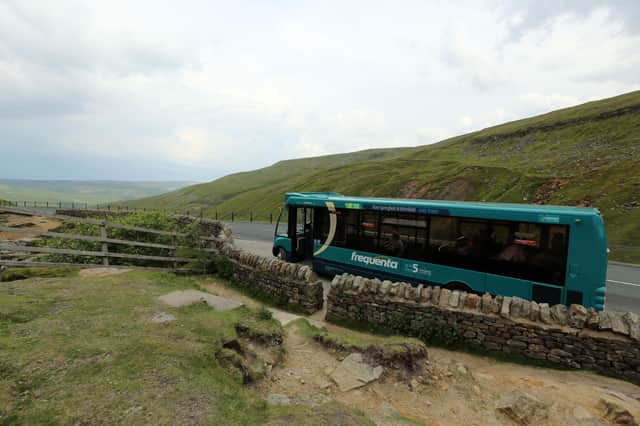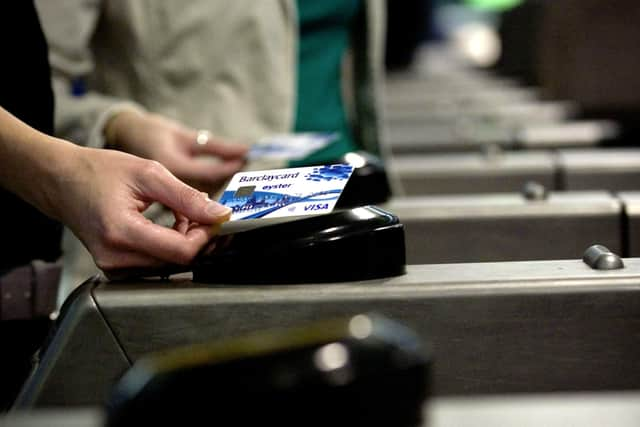How hard can it be to invent a Northern Oyster card? – David Behrens


The premise was simple: on-board cameras recorded in real time the 40-mile journey of the Number 830 as it trundled from Richmond in the east to Ribblehead in the west. As people got on and off, we at home gazed out of the window and watched the scenery roll by. It was strangely mesmerising.
At the time, it was hailed as a public relations coup – a free advert that would have tourists flocking to Yorkshire to experience for themselves the hay meadows and dry stone walls.
But not by bus.


Advertisement
Hide AdAdvertisement
Hide AdThe reality is that public transport is the single biggest impediment to building a sustainable tourism economy in this part of the country – and that’s paraphrasing from a report by the very people supposed to be running it.
For while a quarter of all tourism spending in England is in the North, nearly everyone who comes here does so by car. Crucially, that includes local day trippers who would love to be able to catch a bus or train to the countryside and back again, were such services to exist. Even the Number 830, when the BBC filmed it, ran on Sundays and bank holidays only.
And it’s not just tourists who suffer. Commuters who need to get where they’re going by a combination of bus, train or – in South Yorkshire only – light rail, must purchase separate tickets for each leg because no-one has been able to join the dots on a single transport map. If there were to be a Yorkshire version of the London Tube diagram, it would look like something your granddaughter had knocked up on an Etch-a-Sketch.
Advertisement
Hide AdAdvertisement
Hide AdIt was Transport for the North, the statutory body which is supposed to be transforming the region’s transport infrastructure, that was responsible for last week’s report on tourism. Visitors, it said, were being put off by the unreliability and poor connectivity of our public transport, and the post-Covid boom in staycations was being undermined as a result.
Services between the North’s principal cities were identified as being particularly slow and overcrowded, especially when compared with rail links to London, and the authors concluded that transport companies and regional political leaders would have to work more closely together.
But isn’t it TfN’s job to make that happen? You might have been forgiven for wondering in the light of another report from the same organisation, the very next day. The introduction of a single ticketing system across the region had, it said, been too difficult to implement – causing the abandonment of the £150m “smart” programme that was supposed to make it happen.
Too difficult? It was a classic case of delivering excuses instead of results. Bus and train operators were blamed for being wedded to their own payment systems, and passengers for buying tickets from third-party websites. Every pothole on the transport landscape was an obstacle to London Oyster-style integration, TfN bleated.
Advertisement
Hide AdAdvertisement
Hide AdSurely, though, its officers could have devised a creative workaround. Why not a system of their own that sat alongside the existing fares and gave passengers the choice of buying a single ticket or an all-encompassing one? It’s not rocket science – book tokens and luncheon vouchers have worked like that for years, bypassing retailers’ in-house systems but being welcomed nonetheless because they bring in business. A scheme like this could level up at least one aspect of Northern life at a stroke. And as TfN admitted, most travellers are crying out for just such a system.
But it is this absence of out-of-the-box ideas that has always characterised public thinking. Instead, new slogans are plastered on policies that are as old as the hills, in a governmental game of smoke and mirrors.
If you needed further proof of it this week, you had to look no further than the utterance from the Transport Secretary, Grant Shapps, as he sought to justify his department’s back-of-a-fag-packet notion of foisting clapped-out old Pacer trains on to schools and community groups. He’ll be hailing the return of outside toilets next.
Advertisement
Hide AdAdvertisement
Hide AdMeanwhile, the public transport system remains a cause for debate but not, it seems, reform. If we don’t fix it soon, the Number 830 from Richmond will start to look like an express service.
Support The Yorkshire Post and become a subscriber today. Your subscription will help us to continue to bring quality news to the people of Yorkshire. In return, you’ll see fewer ads on site, get free access to our app and receive exclusive members-only offers. Click here to subscribe.
Comment Guidelines
National World encourages reader discussion on our stories. User feedback, insights and back-and-forth exchanges add a rich layer of context to reporting. Please review our Community Guidelines before commenting.